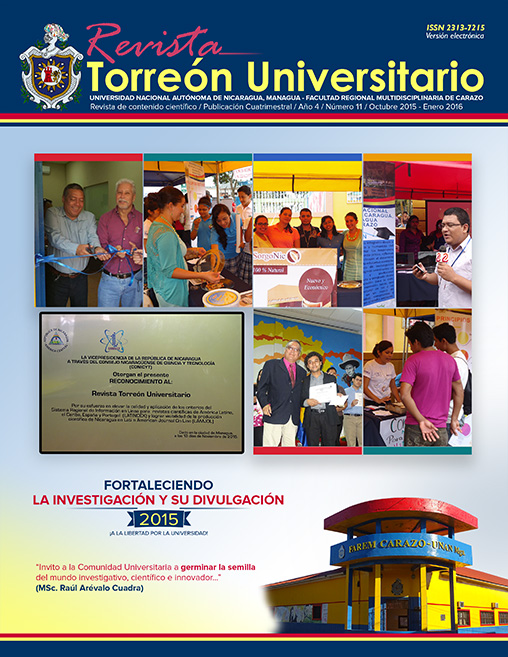Educational Models. Triad for Successful Learning of Social Sciences
Abstract
This article stems from the perceived need and given expressions of teachers who participated in an investigation of the performance of teachers in the area of social sciences in secondary education. The research was conducted through case studies in six secondary schools in Managua. Concluding that teachers need to appropriate of a didactic teaching model that permits them facilitate dynamic, motivating, and meaningful teaching and learning processes.
This proposal is based on the fact that no model is better than other, which is why the eclectic application of the academicist, cognitive, and sociocritic model. These three models or paradigmatic approaches are developed with the intention that the teacher appropriates them and implement them in his/her classrooms.
Downloads
References
ALVIÁREZ, L., MOY KWAN, H. y CARRILLO, A. (2009). De una Didáctica Tradicional a la mediación de los procesos de aprendizaje en los currículos de Educación Superior. Telos, 11, (2), 194-210. Disponible en: http://www.redalyc.org/articulo.oa?id=99312517005
COBO GONZÁLEZ, G. (2007). Nuevos Paradigmas Educativos. Fascículo 3: Los Modelos Curriculares. Perú: Ministerio de Educación: MED.
DELVAL, J. (1983/1993). Crecer y Pensar. La construcción del Pensamiento en la Escuela. (2 Edition). Buenos Aires: Paidós.
DEMUTH, P. (2004). Modelos Curriculares en las carreras de Formación Docente de Nivel Terciario de la ciudad de Corrientes: Psicología y Tecnología. Universidad Nacional del Nordeste. (Tesis de maestría). Instituto de Ciencias de la Educación, Facultad de Humanidades. Chaco, Argentina.
ESCRIBANO, A. (2004). Aprender a Enseñar. Fundamentos de Didáctica General (2a Edition). Cuenca, España: Universidad de Castilla.
FERREIRO, R. (2003). Estrategias Didácticas del Aprendizaje Cooperativo: El Constructivismo Social. Una Nueva Forma De Ensenar y Aprender. México: Trillas.
PAGÉS, J. (1994). La Didáctica de las Ciencias Sociales, el Curriculum y la Formación del profesorado. Revista Signos, 13, 38-51.
PATIÑO TORRES, M. (2006). Modelo Socio-cognitivo: Teoría Educativa y diseño Curricular. [Versión electrónica], 22 (1), 17-40. Recuperado el 15 de octubre, 2014.
QUIROZ, R. Y MESA, A. (2011). Currículo crítico en la formación de ciudadanía. Educere [Versión electrónica], 15 (52), 621-628.
RAMÍREZ BRAVO, R. (2008). La Pedagogía Crítica. Una manera ética de generar procesos educativos. Folios. Revista de la Facultad de Humanidades. (28), 108-119.
Downloads
Published
How to Cite
Issue
Section
License
The authors who publish in this journal agree to the following terms.
- The author or authors of the articles, essays or research grant the National Autonomous University of Nicaragua, Managua (UNAN-Managua) the editing rights (copyright) of the submitted work, therefore the University has the exclusive right to publish the article for the entire copyright period.
- These copyrights/authors authorize Torreón Universitario Magazine and the University to edit and disseminate/publish the article in said Magazine, including printed and electronic reproduction, storage, retrieval and any other type of publication, and sources of secondary information as services. of summaries and databases, they also empower it to protect the article against unauthorized use for dissemination by printed or electronic media (PDF, HTML, EPUB, XML or others).
License for use of content
The magazine uses the Creative Commons Attribution-NonCommercial-NoDerivs 4.0 International License.
Under this statement:

This journal is licensed under a Creative Commons Attribution-NonCommercial-NoDerivatives 4.0 International License. It can be copied, distributed and transmitted publicly as long as the author and source are cited (Revista Torreón Universitario), it should not be modified or used for any commercial purpose. The full license can be found at http://creativecommons.org/licenses/by-nc-nd/4.0/.



